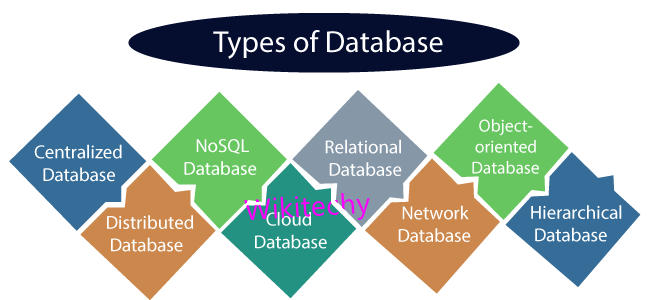The different types of databases are:

Hierarchical Database
- In this database data is organized in a tree like structure.
- Data is stored in the form of either top down or bottom up approach.
- Data in this database is represented in the form of parent-child relationship.
- In this database parents have many children but child can have only single parent.
Network Database
- In database children can have more than one parents.
- Many to many relationship complexities can be reduced in this database.
- Here entities are organized in a graphical format which can be accessed through several paths.
Relational Database
- One of the widely used and easy to use database is relational database.
- Normalizing of data in the row and column can be acheived using relational database.
- These relational models are stored in fixed structures and are manipulated using SQL.
Object Oriented Database
- Data in these database are stored in the form of objects.
- The structure that displays data within it is are called as classess.
- Class is a component of database that displays database as a collection of objects which can store both data members values and operations.
Personal Database
- Collecting and storing data on a personal system is known as Personal Database.
- This database is designed only for a single user.
- These type of databases are very easy to handle.
- As the size of these database is very small, it needs less storage space.
Operational Database
- Databases that gets created and updated in real time is called as Operational Database.
- These types of databases are designed for executing and handling daily operations like per day transactions of several business.
Enterprise Database
- For managing huge amount of data organization or enterprise uses these types of database and it helps them to increase and improve their efficiency.
- Simultaneous access to multiple users can be done using these databases.
- We can use Multiple process on these type of databases.
- Parallel execution of queries on the system is allowed in these databases.
